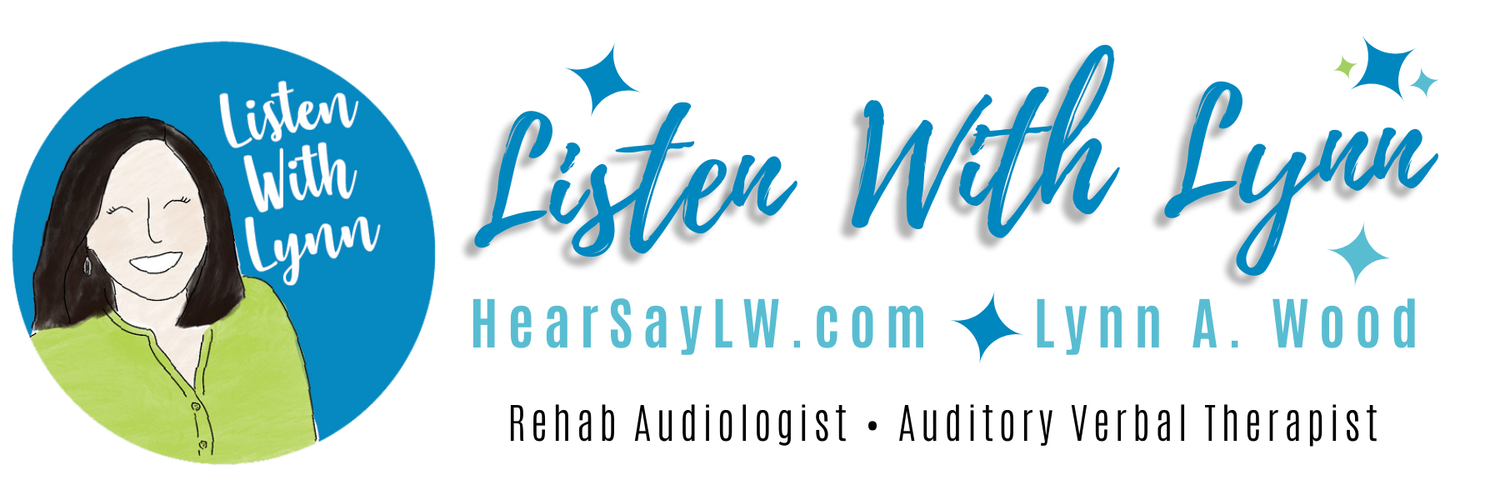Today's post is an oldie but goodie written by my friend and colleague,
Mary Boucher Jones MA CCC/S LSLS Cert AVT
Listen and Learn Communication Center Indianapolis, Indiana
We presented this information in Vietnam together at Parent Night when volunteering with the Global Foundation For Children With Hearing Loss
________________________________________________________________
Promoting Listening and Language Development Through Everyday Experiences
The everyday chores of home
living provide an abundance of opportunities to develop language skills.
Include your child in your daily activities
and enrich his language as you talk to him about what you are doing.
 |
Here are
some examples of household activities that can be turned into a fun learning experience
for your child.
_________________________________________________________________
Setting the table Getting
a haircut
Washing the dishes Ironing
the clothes
Sweeping the floor Watching
Daddy shave
Dusting the furniture Watering
the plants
Making the bed Scouring the
sink
Going grocery shopping Putting
groceries away
Buying new ____________ Visiting
a friend or relative
Filling the gas tank Washing
a car
Going to the bank Changing
a light bulb
Fixing a broken ___________ Looking
at a newspaper
Feeding a pet Doing
the laundry
Checking a hearing aid or
cochlear implant Taking a
bath
Shampooing hair Brushing
teeth
Mowing the lawn
Visiting the post office
Visiting the post office
Preparing dinner Preparing
a special treat
Eating at a restaurant Taking
a walk
Activities for Expanding Language Doing the Laundry
 |
| http://cache2.asset-cache.net/ |
Listening Activities
· Listen to the water filling the washing machine drum.
· Listen to the water changing cycles.
· Listen to the turning dials.
· Listen to the motor sounds.
· Listen to clothes bumping in the dryer
· Listen to buzzers and timers.
Cognitive Activities
· Sort clothes by color.
· Sort clothes by which body part they cover.
· Sort like clothes together (pants together, socks together, etc.).
· Sort clothes by their owner. (Mom, Dad, sister, brother, etc.)
· Sort clothes by texture. (soft, silky, rough, etc.)
· Sort clothes by design. (stripes, checks, prints, etc.)
· Sort clothes by function. (school clothes, play clothes, church clothes, etc.)
· Compare lengths (Mom’s pants, Dad’s pants, and Child’s pants)
· Compare sizes.
· Sort clean and dirty clothes.
Vocabulary to Target
Verbs
sort separate find
spray (prewash) pour take out
load listen open/close (lid)
push turn fill
(washer)
fold hang match
(socks)
collect pick
up gather
Watch (water line and agitation)
_________________________________________________________________
Items Needed
washing machine clothes detergent
pre-wash bleach stain
remover
fabric softener clothes line clothes
pins
dryer drying rack lint
hamper laundry
basket
______________________________________________________________________
Types of Clothes (purpose)
play clothes school
clothes work
clothes
special occasion clothes pajamas exercise clothes
uniforms
_________________________________________________________________
Types of Clothes (names)
pants shirts dresses
shorts socks skirts
tops blouses nightgown
jeans capris jacket
coat underwear diaper
***Once one name is known for
an object occasionally substitute a synonym when appropriate.
For example:
socks: stockings, tights, panty hose, knee socks
______________________________________________________________________
Describing Clothes
Appearance
colors striped checked
patterned printed wrinkled
fabric names (corduroy,
denim, colorful
______________________________________________________________________
Describing Fabric Texture
soft rough bumpy
smooth silky heavy
light-weight damp wet
dry scratchy
_________________________________________________________________
Parts
of Clothing
collar sleeve cuff
leg zipper snap
button hook buckle
Question To Ask?
Whose
_______________________? (pants, socks, sweater, etc.)
Where are
_____________________? (clean clothes, soft clothes, striped clothes, etc.)
Where do you
wear______________? (socks, hats, pants, etc.)
How does ____________feel?
What kind of clothes?
(uniform, pajamas, school clothes, etc.)
What do you wear ___________?
(on your feet, on your arms, on your head, etc.)
What do we do ____________?
(first, next, last, etc.)
When do you wear________ ?
(a jacket, pajamas, a uniform, etc.)
When do we put ______
in? (detergent, fabric softener,
clothes, etc.)
Which clothes are ________
(Mommy’s, play clothes, soft, dirty, etc.)
Can you find another________
(pair of pants, sock, shirt that is Daddy’s, etc.)

